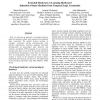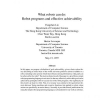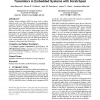36 search results - page 2 / 8 » Binary fuzzy goal programming |
JUCS
2006
13 years 5 months ago
2006
Abstract: Multi-adjoint logic programming represents a very recent, extremely flexible attempt for introducing fuzzy logic into logic programming. In this setting, the execution of...
EH
1999
IEEE
1999
IEEE
Evolvable Hardware or Learning Hardware? Induction of State Machines from Temporal Logic Constraints
13 years 9 months ago
Here we advocate an approach to learning hardware based on induction of finite state machines from temporal logic constraints. The method involves training on examples, constraint...
KR
1998
Springer
13 years 9 months ago
1998
Springer
In this paper, we propose a definition of goal achievability: given a basic action theory describing an initial state of the world and some primitive actions available to a robot,...
CASES
2007
ACM
13 years 9 months ago
2007
ACM
Dynamic binary translation (DBT) has been used to achieve numerous goals (e.g., better performance) for general-purpose computers. Recently, DBT has also attracted attention for e...
AI
1998
Springer
13 years 5 months ago
1998
Springer
In this paper, we propose a definition of goal achievability: given a basic action theory describing an initial state of the world and some primitive actions available to a robot...



